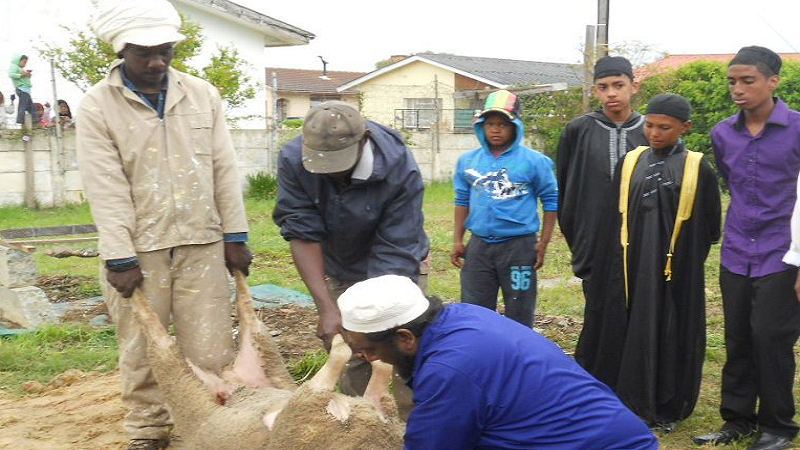While hujaaj prepare for the official start of the Hajj pilgrimage, Muslims in South Africa and around the world prepare for Eid al-Adha, or the “Eid of sacrifice”. Muslims across the globe will mark Eid al-Adha by slaughtering animals as an act of sacrifice. However, for those with questions surrounding the practice and the humane treatment of animals, director of the Muslim Judicial Council’s Halaal Trust, Shaykh Achmat Sedick as well as SPCA inspector, Carina Bodenstein have provided insight.
“It [slaughtering] is an age old sunnah [favourable practice in Islam]. The sunnah itself is known today as qurbaan,” said Shaykh Sedick.
“When we slaughter, we slaughter a sacrificial animal. The animals that we slaughter are sheep, goats, camels and cattle.”
The qurbaani practice typically happens on the tenth of the Islamic month of Dhul Hijjah – the day of Eid al-Adha.
“The slaughtering has various conditions and is also linked to the Society for the Prevention of Cruelty to Animals (SPCA). There is a humane treatment of the animals that is essential,” said Shaykh Sedick.
“Whenever you do the slaughtering, the basic requirement is humane treatment. There are certain conditions on how you acquire the animal and the condition that the animal must be in – it must be in a good and healthy condition.”
Knives used in the qurbani need to be razor-sharp, cannot be serrated and the throat of the animals are cut in a particular fashion to ensure minimal trauma.
“You shouldn’t make the animal anxious – even when you bring it to the slaughtering point. You need to be very careful about how you slaughter the animal. You also can’t slaughter one animal and let the others observe, nor can you sharpen your knife in front of the animals.”
SPCA inspector, Carina Bodenstein added that the SPCA will be conducting inspections throughout the city of Cape Town, ensuring that the rights of animals are upheld. The role of the SPCA is to inspect facilities and animals, to offer advice, and to ensure that all animals are treated humanely in terms of the Animals Protection Act No. 71 of 1962 .
“We do surprise inspections and these inspections are conducted in terms of the Animals Protection Act. This means that we, as the SPCA, inspect in terms of the welfare of the animals. We aren’t there to interfere with religion.”
“If you do everything in accordance with the Quran, there won’t be any issues…It is a beautiful sacrifice if you do it according to the Quran.”
According to the Animals Protection Act (No.71 of 1962):
• All animals must be provided with adequate space, ventilation, shelter, food and water;
• All animals must be handled humanely; no animal should be picked up by its fleece, dragged, hit, chased or prodded;
• Vehicles and trailers must be suitable for the species (which must not be mixed) and non-slip flooring is necessary;
• Animals must not be tied, tethered, bound or restrained inhumanely and must not be placed in the boots of cars or sealed vehicles;
• When due to be slaughtered, animals should be laid on their sides and not on their backs to avoid distress. Animals should also not be forced to stand or kneel during slaughter;
• Knives used for the slaughter must be of suitable size and also remain extremely sharp so that the slaughtering remains as humane as possible;
• Only experienced people should perform the slaughtering. Inexperienced, laypersons who attempt to perform the slaughters often cause horrific trauma and pain to the animal.
The CoGH SPCA advises those who are inexperienced, but want to partake in Qurbani, to contact the CoGH SPCA Inspectorate on 021 700 4158/59 or after hours on 083 326 1604 for referral to experienced establishments or for any advice in terms of animal welfare.
Members of the public who do wish to perform Qurbani at their residential premises must ensure that the animals are slaughtered humanely by an experienced person. Permission must be obtained from your local City of Cape Town environmental health office.
Bodenstein said the SPCA strongly discourages the slaughter of cattle in places that do not have the appropriate infrastructure in place to adequately and humanely restrain the animals prior to slaughter.
Shaykh Sedick reminded Muslims planning on sacrificing that if the slaughtering is done prior to Eid salaah [prayer], it is not considered qurbaani.
He also added that slaughtering a goat or sheep is equivalent to one person, while slaughtering a bull, cow or camel will be for seven.
VOC






 WhatsApp us
WhatsApp us 

